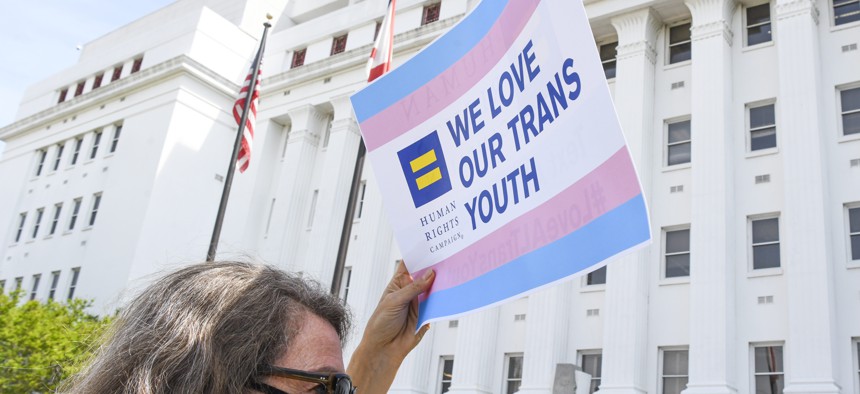Transgender and Nonbinary Candidates for State Legislature are Poised to Gain Ground This Year

Jodi Womack holds a sign that reads "We Love Our Trans Youth" during a rally at the Alabama State House to draw attention to anti-transgender legislation introduced in Alabama on March 30, 2021 in Montgomery, Alabama. There are so far 192 anti-LGBTQ bills under consideration in state legislatures across the United States. Of those, 93 directly target transgender people. Photo by Julie Bennett/Getty Images
Prompted to run by a wave of anti-transgender legislation, they are running for statehouse seats in at least eight states, but remain underrepresented in legislative chambers around the country.
Jessica Katzenmeyer is poised to make history as the first transgender woman elected to the Wisconsin Senate, but when she's out knocking on doors in the suburban Milwaukee district where she's running, her trailblazing candidacy seldom comes up.
Instead, Katzenmeyer says she hears from voters worried about abortion access and frustrated by political dysfunction. "People are tired of the government not working and they're tired of the bickering that goes on in Madison,'' she said.
Still, Katzenmeyer, a Democrat who serves on the land use board in her hometown of West Allis, Wisconsin, grasps the significance that her victory would represent.
"There's never been anyone who looks like me in the state Legislature here in Wisconsin,’’ she said this week. “If people see me running and see me as a visible and successful [candidate], they might say 'oh, I can do it as well,’ and then you’ll have more LGBTQ people, especially trans people, running.”
Katzenmeyer is part of a wave of transgender and nonbinary people running for elected office across the nation this year.
Victory Fund, a non-partisan group that backs LGBTQ candidates at all levels of government, said the number of openly transgender people running for office has been rising steadily since 2018.
There are 27 transgender and 13 nonbinary candidates for state legislature on ballots this November, up from a combined total of 16 (14 transgender and two nonbinary) five years ago.
Some of those candidates were motivated to run by the deluge of anti-transgender legislation proposed in recent years by Republican-controlled legislatures, said Albert Fujii, spokesperson for the Victory Fund. According to Freedom for All Americans, which advocates for nondiscrimination protections for LGBTQ people, dozens of states introduced anti-transgender proposals, from bills that bar transgender youth from participating in interscholastic sports to measures that criminalize gender-affirming healthcare.
Last year, Zooey Zephyr, a transgender woman and a former wrestler from Montana, testified against a bill to ban transgender athletes from competing on the high school and college teams that correspond with their gender.
“Trans men, women & children all came forward to share our stories & ask the governor's office to honor our humanity by opposing these bills,’’ she tweeted at the time. “It would be the right decision—the just decision. I hope they stand up for us.”
But Montana’s Republican Governor, Greg Gianforte signed the legislation into law, leading to a lawsuit accusing the Legislature of overreach.
The experience prompted Zephyr, a Democrat, to run for a seat in the Montana House of Representatives. In June, she and SJ Howell, a fellow Montana Democrat who is nonbinary and identifies as queer, both won their respective primaries; they are favored to win their Democratic-dominated districts in November.
Milestones in Virginia and Delaware
Danica Roem became the first openly transgender state lawmaker when she was elected to the Virginia House of Delegates in 2017. Three years later, Sarah McBride won a state Senate race in Delaware, notching another milestone for the trans community.
This year, there are transgender candidates running for statehouse seats in at least eight states: New Hampshire, Minnesota, Wisconsin, Delaware, Rhode Island, Vermont, Colorado and Montana.
Yet despite the recent increase in numbers, transgender and nonbinary state lawmakers are still underrepresented in legislative chambers, and four states—Alaska, Louisiana, Mississippi and South Dakota—have no LGBTQ lawmakers.
“We always say representation matters,’’ Fujii said. “There were no trans people in the legislative body when they were trying to pass bans on trans people.”
Wisconsin's Republican-controlled Legislature was among the state legislatures passing measures in 2021 barring transgender athletes from interscholastic sports. The bills were vetoed by Democratic Gov. Tony Evers.
“That’s one of the big things that the governor has been able to do: block a lot of these horrible anti-LGBTQ bills like the anti-trans athlete bill, which is ridiculous,’’ said Katzenmeyer, the Wisconsin state Senate candidate.
She ran for the Wisconsin House of Representatives two years ago and lost. This year, after handily winning the Democratic Party primary, she faces Republican Rob Hutton, a former state representative.
The open Senate seat in Milwaukee’s western suburbs is among the most competitive in Wisconsin and the outcome could determine if Evers hangs on to his veto power. The district had long been reliably Republican but that’s shifting: Joe Biden won here by one percentage point in 2020.
Katzenmeyer said she’s heard from voters who are concerned about the U.S. Supreme Court decision reversing Roe v. Wade and worry that Wisconsin lawmakers could institute an 1849 statute criminalizing abortion, something she's vowed to block.
“If I lose, I could change history in Wisconsin forever,’’ she said, “but if I win, I could also change history in Wisconsin forever.”
“I know how important this race is," she added, "and it’s overwhelming at times.’’
Daniela Altimari is a reporter at Route Fifty.
NEXT STORY: A New Tech Tool to Help Communities Confront Climate Risks





